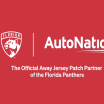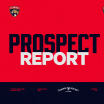The Florida Panthers Foundation's Community Champions Grant Program allows charitable organizations throughout South Florida to request financial support for programs and initiatives that are benefiting our community. Here are their stories.
The Florida Panthers are working hard to give their namesake a better home.
Champion Check-In: Florida Wildlife Corridor
By
Jameson Olive
FloridaPanthers.com
As part of their annual Panther Conservation Night in March, the Florida Panthers Foundation awarded a $25,000 Community Champions Grant to the Florida Wildlife Corridor to support a special Panther-related project led by local conservation photographer Carlton Ward Jr.
"It's really great that the Panthers organization sees the animal as more than a mascot," Ward Jr. said. "It's helping us bring awareness to the statistics and interesting facts about the panther, but also about the land it needs to survive and thrive in this area."
The Florida Wildlife Corridor is a statewide network of lands and waters that supports wildlife and people. The Corridor encompasses 15.8 million acres of land, including 9.5 million acres that are already protected and 6.3 million acres that do not have conservation status.
There are currently 42 federally listed endangered species, 24 threatened species and 15 candidate species that reside within The Corridor, with an additional 176 species listed as endangered, 56 as threatened and 29 as species of special concern at the state level. "We are not experts in panther conservation, so we really look to our experts like Carlton Ward Jr. to educate us about the plight of the panther," Florida Panthers Foundation Executive Director Lauren Simone said. "It's so important to have these experts to teach us. We're learning just like our fans."
The Florida panther -- the state's official animal since 1987 - is unfortunately one of the most endangered mammals in the world, with an estimated 150 to 200 living in the wild as of 2017.
As an umbrella species, the Florida panther protects many other plants and animals that live in South Florida. At the top of the food chain, panthers not only keep feral hog numbers in check, but also make sure that deer, raccoon and other populations remain balanced and healthy.
But as their natural habitat continues to shrink, motorists, particularly those driving through what is known as "Panther Country" -- State Road 29 and Alligator Alley (I-75) -- have begun to come across these animals at an alarming rate, leading to numerous Florida panther deaths.
In order to bring attention to the struggles of the panther and the importance of The Corridor, Ward Jr. will use his Champions Grant to further his enthralling "Path of the Panther" project.
"It's a storytelling initiative to show people how these animals are using the land and to help people understand the land that we need to save," Ward Jr. said of his project. "The place that we did the interview for Panther Conservation Night], people don't even know that we have cattle ranching in Florida or that without those cattle ranches there is no hope for recovery for the Florida panthers.
"These are millions of acres of land that help keep the Everglades connected to our country. Florida's population is growing rapidly with 1,000 people a day moving here. The projection is that if we keep developing the way we have been we're going to lose 5 million acres by 2070.
That's why we really need to get ahead of this and use the story of the panther to show why we need to save these large areas…. To have a chance to recover a big cat throughout the state of Florida and save the species, it's also going to help us save the Everglades and save ourselves here."
To learn more about "Path of the Panther," visit
[http://floridawildlifecorridor.org/path-of-the-panther
.


















